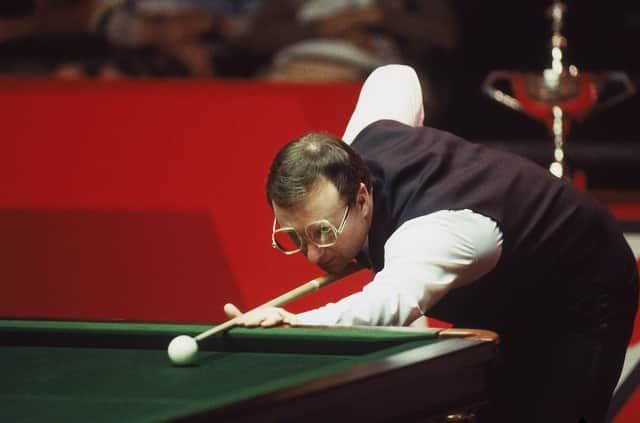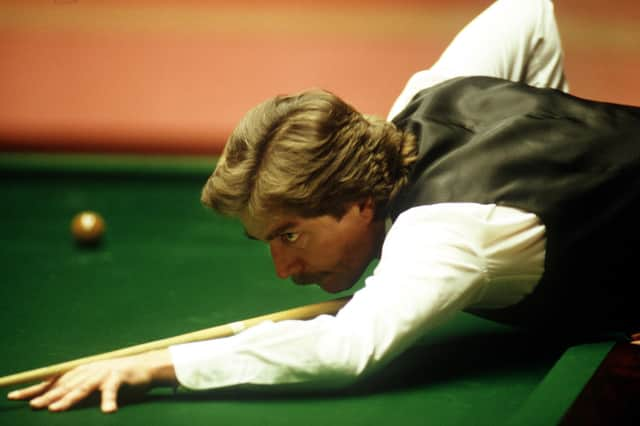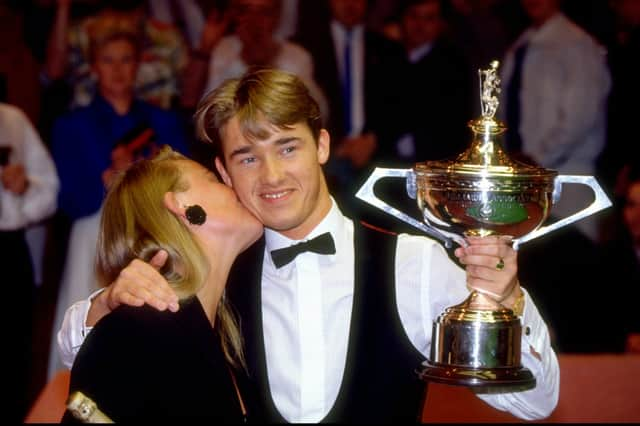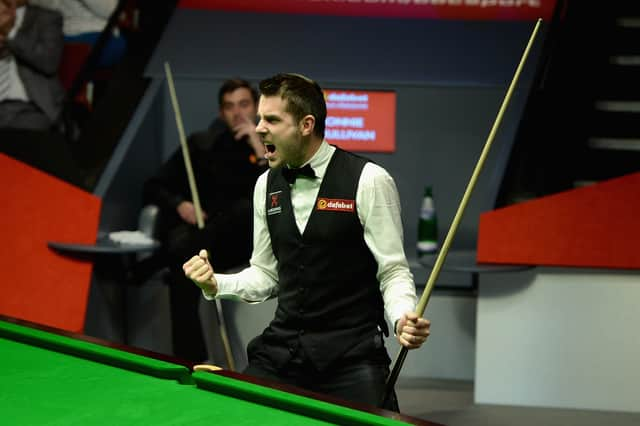The Best World Snooker Championship Final Comebacks at the Crucible Theatre


Falling several frames behind in a world championship final is far from ideal, but it certainly doesn’t mean hopes of claiming snooker’s ultimate prize are over, as these world title winners can vouch for...
1980: Cliff Thorburn 18-16 Alex Higgins (from four frames down)
The fourth installment of the world championship at Sheffield’s Crucible Theatre and the first time the final was a best of 35 frames affair; a format that has remained unchanged since.
Advertisement
Advertisement
A clash of characters and playing styles – but two of the sport’s star cast – Higgins looked set to back up his pre-tournament claim of it being “the year of The Hurricane” as he led 5-1 and 9-5 in pursuit of his second world crown.
However, the Northern Irishman’s discipline waned, and the collected Thorburn capitalised on this, finishing the opening day level at 9-9.


The players were locked 13-13 going into the final session, and later at 16-16, before the Canadian registered runs of 119 and 51 to record an 18-16 win and his maiden world title.
Thorburn was the first player from outside of the United Kingdom to triumph at the Crucible.
Advertisement
Advertisement
1985: Dennis Taylor 18-17 Steve Davis (from eight frames down)
Undoubtedly snooker’s most famous match, world number one and reigning champion Steve Davis was aiming for his fourth title in just five years. His final opponent Dennis Taylor was an established player and a ranking event champion, but a firm underdog.
It was all going according to plan for the machine-like Davis who completed a first-session 7-0 whitewash before extended his lead to eight. However, a missed pot on the final green in frame nine allowed Taylor to clear to pink and open his account.
Davis won the next frame for 9-1, but Taylor rallied, stringing together the final six frames of the evening session to trail just 9-7 overnight.
The concluding day was pure drama. Taylor managed to level at 11-11, but Davis kept nudging away on the final straight, and he stood on the edge of glory once again at 17-15 up.
Advertisement
Advertisement
Taylor had come so far that he wasn’t going to give up, though, and he managed to haul himself level at 17 all to force a deciding frame.
Well past midnight, the conclusion of the 68-minute decider became one of the most iconic sporting moments, ever. It all went down to the final black ball, and after an epic exchange and unexpected miss from Davis, Taylor held his nerve and sank the black for the title. It was the first time throughout the entire match he had led.
1992: Stephen Hendry 18-14 Jimmy White (from six frames down)
A couple of years on from their first meeting in a world championship final, Stephen Hendry and Jimmy White once again clashed for the sport’s biggest accolade.
In the opening round, White compiled the second 147 maximum break at the Crucible, and hopes were high heading into his fourth world final that he would finally be crowned king.
Advertisement
Advertisement
A blockbuster encounter, both players made a century in the first mini session, but it was White who established a 10-6 overnight lead.
‘The Whirlwind’ began the concluding day in great style, leaving his opponent pointless in the first two frames as an effort of 134 put him 12-6 up. He later went 14-8 ahead and seemingly on course for glory.
You were never safe, though, against the world number one. Hendry won the final two frames of the third session, including a memorable counter-attack of 64 in frame 24 that included an all-or-nothing pot on the brown.
When White missed effectively frame ball red in the first frame of the evening session and Hendry subsequently cleared up, it was confirmed that momentum had shifted. Needing just a sniff of an opportunity, the predatory Hendry got stronger in the closing stages as he hit three half-centuries and three centuries within a 10-frame winning streak to deny White again and become a multiple-time world champion.
Advertisement
Advertisement


2000: Mark Williams 18-16 Matthew Stevens (from six frames down)
The first world championship of the new millennium produced the tournament’s first all-Welsh final, as friends Mark Williams and Matthew Stevens dueled for the biggest title in the sport. Earlier in the same season, Williams ousted Stevens 10-8 in the UK Championship final.
Having been denied by Stephen Hendry in his first world final appearance 12 months before, Williams recovered from 15-11 down to defeat John Higgins 17-15 in the semi-finals and get another crack at the trophy.
However, it was 22-year-old Stevens – in his maiden world championship final – who led 10-6 after the opening day before extending his advantage to 12-6 and 13-7 on day two.
The tide began to turn at the end of the third session as Williams claimed the final four frames to reduce his arrears to just two at 13-11. In the evening act, he took three of the first four frames to go level at 14-14.
Advertisement
Advertisement
Despite Stevens making five century breaks during the tie, it was Williams who got to 18 first, completing a career triple crown in the process.
2005: Shaun Murphy 18-16 Matthew Stevens (from four frames down)
Stevens experienced a similar sinking feeling in 2005 during his second world final outing as 22-year-old qualifier Shaun Murphy shocked the snooker world.
In pinching frame 16 on the final pink, Stevens led 10-6 overnight, the exact position he found himself in against Williams five years earlier.
Murphy – quoted as 150/1 with bookmakers at the start of the event – fought back the next day and went one behind at 11-10. A 40-minute frame 22 may have proved pivotal, as Stevens missed frame ball blue playing it left-handed and Murphy mopped up to draw level.
Advertisement
Advertisement
Stevens won the final frame of the session to go back in front, but on resumption, world number 48 Murphy levelled with a 107 and then led for the first time since taking the opening frame.
To Stevens’ credit, he recovered from 15-13 and 16-14 down to draw level, but Murphy continued to deliver his attacking approach under the most extreme of pressure, producing breaks of 97 and 83 in the final two frames to become just the second qualifier in Crucible history to lift the trophy.


2014: Mark Selby 18-14 Ronnie O’Sullivan (from five frames down)
To date, Mark Selby is the only player to have defeated Ronnie O’Sullivan in a world championship final after he denied ‘The Rocket’ a third consecutive world crown in an epic 2014 title decider.
Selby already had previous form in stopping O’Sullivan collecting silverware; at both the 2008 Welsh Open and the 2010 Masters he came back from three down with four to play.
Advertisement
Advertisement
On a 14-match Crucible winning streak, O’Sullivan won the opening session 5-3 and inflicted further damage in the evening as he went 10-5 ahead. The turning point was frame 16, as O’Sullivan missed a black off its spot having been distracted by his tip. Selby pounced, taking that frame and the final one of the day to go three behind at 10-7.
Having made only three half-centuries during day one – with a highest of 62 – Selby compiled just as many in the opening three frames of day two as he caught O’Sullivan before nudging ahead.
O’Sullivan levelled, but memorably missed a simple pink in frame 23 to take a lead going into the final session, a position that Selby acquired by potting the final two balls.
In the closing session, Selby went three clear at 15-12, although O’Sullivan came back to within one. However – despite having not been at his best – Selby upped his game when it mattered most, making breaks of 127, 87 and a title-winning clearance of 35 on the black to secure his maiden world championship glory.
Advertisement
Advertisement
2017: Mark Selby 18-15 John Higgins (from six frames down)
Selby was at it once again three years later, coming from even further behind to deny another multiple-time world champion in John Higgins.
The Scot was in control after the first session at 6-2 up, a lead he bettered in the evening session to 10-4. But just like he did against O’Sullivan, Selby finished day one on a positive note, scoring strong as he chalked up the final three frames to trail 10-7.
That late-night momentum was brought into the final day as Selby made it 10-9. Higgins stopped the rot with frame 20, but ‘The Jester from Leicester’ went on his second five-frame winning streak of tie to go 14-11 up. It meant he had won 10 of the last 11 frames.
Roles began to reverse in the evening as Higgins won three frames from 16-12 down, although Selby responded in supreme style with breaks of 131 and 75 to defend the title and claim a hat-trick of world crowns in just four years.